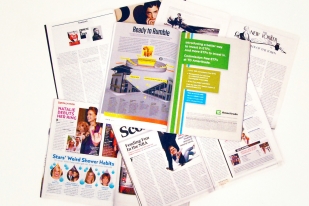The Crisis at the Front of the Book
On a Tuesday night some weeks ago, at a jam-packed book party at Sidecar, the handsome upstairs space next to P.J. Clarke's on East 55th Street, Hugo Lindgren was leaning on the bar next to his deputy. The new editor of The New York Times Magazine had been on the job less than a month, and his coming reinvigoration of the once-great Sunday supplement was shaping up as one of the most exciting projects in New York journalism.
When a new editor takes over a magazine, overhauling the front of the book is almost always at the top of the to-do list—and sure enough, one of Mr. Lindgren's first official moves had been to hire Greg Veis, the talented young online editor of The New Republic, to do just that.
With this in mind, The Observer bellied up to Mr. Lindgren to talk redesign. A lot of front sections seemed to lack vim these days, we said. Was there any title in particular from which Mr. Lindgren would take inspiration?
A great front of the book? Are you kidding? "If you find one," Mr. Lindgren said, "will you let me know?"
If you ask around the magazine world—at Condé Nast, at Hearst, at Time Inc.—you'll quickly find a consensus that something is wrong with the front of the book, once the calling card of great editors.
The front section usually is where publications speak in their own voice, on the broadest range of subjects with the most specific comments. And some of them are still pretty great. (Just ask any star who reads Us and realizes they're "Just Like Us.")
But many front-of-the-book sections are in deep trouble, a charticle-size version of the angst infecting the glossy world in general. When readers are bombarded online with short items and attitude all day, do they really want that when they relax with a magazine in bed at home?
The future of the front of the nation's biggest magazine titles is of interest well beyond their mastheads. These sections, after all, were created in part for advertisers, who wanted something light and breezy up front. Most magazines still cluster ads in the first third of their pages; weakness in the front of the book could exacerbate the industry's financial problems.
Some titles are ditching the FOB as we know it altogether. The Week keeps racking up readers and revenue in part by having no distinguishable front—the whole magazine is a news-roundup-and-commentary digest. Further upmarket, Bloomberg BusinessWeek (where Mr. Lindgren was executive editor before landing the Times Magazine job) was the last big, newsy title to be overhauled. The renovation, which met with surprisingly universal praise for a title not particularly beloved by media insiders, eschewed a traditional front section. Instead there are five and sometimes six sections on broad topics like global economics, policy, markets and finance, which together can take up two-thirds of the magazine's pages. It sounds dreary. But the reaction that nearly every first-time reader has, BusinessWeek staffers say, is surprise at how chock-full and info-packed and useful the book feels.
At New York, still the standard-bearer of the weekly magazine, the front of the book is perhaps the one thing editor Adam Moss hasn't totally figured out. Mr. Moss redesigned the weekly's Intelligencer section when he arrived and has continued to tinker with it ever since. In June 2007, readers thumbed past the table of contents to find the letters page replaced by one called Comments—"primarily because, well, so many of the comments about the magazine no longer come in the form of letters," an accompanying note read. "Instead, they come in emails, in blog posts, in Web links, and, in one glorious recent instance, through an on-air shout-out on The Colbert Report." (Old-fashioned letters, The Times noted earlier this month, now tend to be written only by the incarcerated.)
More recently, New York has itched to shake up its Intelligencer operation once again. Mr. Veis, a hot ticket, went to The Times Magazine only after turning down an offer from Mr. Moss to work on Intelligencer and other parts of the magazine, a position that eventually went to Rolling Stone's James Burnett.
Part of the problem is that taken individually, the things that have traditionally gone in front-of-the-book sections seem hopelessly outmoded. News roundups: terrible except in The Week. Short items with a dose of attitude: Your RSS reader is choking with these. Letters to the editor: Has any magazine component been better ridiculed by anyone than by Edith Zimmerman's "Letters to the Editors of Women's Magazines" on The Awl?
- Tags:
- Media |
- The Daily Transom |















